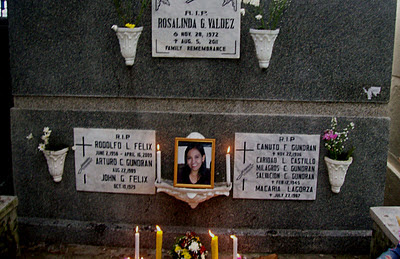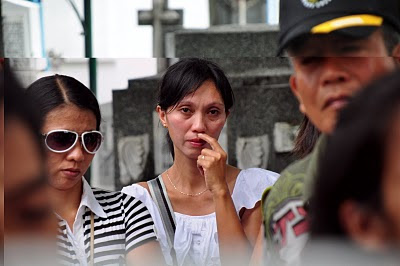(undelivered)

GOOD afternoon. On behalf of our family, I thank you all for coming here today to honor the life of a remarkable woman. She was my best friend, my lover and soul mate. She was my wife, and the mother of my three children. I shall truly miss her.
Rosalie, the sunshine of my life for over 14 years, succumbed to breast cancer (stage 4) with liver complication last August 5, 2011. She was only 38.
Someone had told me that losing your partner in marriage is one of life’s most traumatic events. Though I would say, losing a mother, for my kids, and a beautiful daughter, for my mother-in-law, would merit the same pain, the same trauma. But again, I would say, death by any reason or definition is very difficult for the bereaved. Nothing will be the same again. But we are thankful that Rosalie's suffering was brief and her passing peaceful.
Last June this year my dear wife Rosalie felt an abdominal pain which lasted for almost three months and culminated in the loss of her life. On July 22, upon the advice of her sister and a cousin, she was convinced to be admitted in the hospital. I said “convinced” or I might say “forced,” because days before that, she vehemently refused any suggestion from her immediate family to go the hospital and be treated by doctors. In spite of the bearable pain, she chose to be given medication instead. She had that fear of surgery, of doctors operating on her. You might say it’s an imprudent decision, but please understand that my wife was just being confused, a personal turmoil that had started two or three years ago, where she was first diagnosed of the dreadful "big C." It was her choice to keep it to herself, and I had respected that.
And this I would like to ask you, and it’s for you to judge: did my wife choose the best thing for her? Did we, her family, fail to guide her and give what’s best for her? But did anyone of you know very well what’s best for her?
Before I go on, please respect whatever decision my wife had made. That was her decision and her family respected that, at sana ay mauunawaan ninyo rin siya. Stage 2 cancer is curable, sabi nila. Pero may namamatay din. Marami na rin ang nag-survive sa cancer, sabi nila. Pero karamihan, namamatay din pagkatapos ng maikling gamutan ngunit napakalaking halagang nagastos. May nagsabi na wala ring silbi ang pera kung kanser ang tumama sa katawan, maaaring maubos ang iyong naipon ngunit mamatay ka rin pala. Walang kaibahan ito sa hindi na nagpa-opera at mamatay din, as expected. Maaaring sa operasyon ay madurugtungan ang buhay ng pasyente. Maaaring may total healing. Pero depende pa rin sa kanser, at sa kondisyon ng katawan ng isang tao. So how can you be sure na kung nagpaopera si Rosalie, at sumailalim sa kinatatakutan niyang chemotherapy treatment ay gagaling siya ng tuluyan?
Rosalie's father died of cancer when she was 17 years old. One of her officemates died also of cancer (breast cancer), na lagi niyang pinapaalala sa akin tuwing iminumungkahi ko ang operasyon. Baka daw makatulad niya rin ito na namatay pagkatapos gumastos ng napakalaki sa operasyon at chemoteraphy. Alam po lahat ni Rosalie ang mga ito; yun lang po ang asawa ko ay ayaw sumugal sa buhay.
Ganunpaman, tuloy-tuloy ang pagdarasal ng asawa ko; gabi-gabi nagrorosario siya. Early this year, she started doing a novena to the Shrine of Divine Mercy in Marilao. May kaibigan kaming nagsabi na may mga gumaling na sa pagnonobena rito. At iyon nga po ang ginawa niya. Hanggang sa huling mga araw niya sa ospital, tangan-tangan niya ang kanyang maliit na rosaryo at ang pampleto mula sa Divine Mercy. Umaasa siya na siya ay gumaling para sa pamilya niya. At kung ano man ang naging panalangin niya hanggang sa huling sandali ay hindi ko na po alam.
Please understand her. We respected her decision, we guided her, and we prayed for her. We did not leave her alone. And we did not cause her death.
Ngayon ko lang napagtanto ang isang katotohanan, na mas malakas ang loob ni Rosalie kaysa ako na asawa niya. Mas matapang ang loob niya, mas malalim ang paniniwala niya sa Diyos. Sa tindi ng hirap na dinanas niya, upang hindi na ako gumastos para sa operasyon, at upang hindi mabawasan ang aming ipantustos sa pag-aaral ng mga bata, ay isang bagay na hindi mawaglit sa isip ko.
If we are to make any sense out of this tragedy, it is that life is both fleeting and precious. I have also been told that in time, the pain that I feel would subside and that I would only possess the marvelous memories of our lives together.
It all started in Rex Printing Co., in Quezon City where I worked as a proofreader. Siya naman ay nahuling pumasok as a circulation clerk ng Publications Department. Ipinakilala siya sa akin ng kanyang kaibigan na si Leah Bartolome na kaklase niya sa PSBA.
But prior to our meeting, or before my final interview at Rex, nagdasal ako noon sa Sto. Domingo Church, malapit kasi doon ang opisina ng Rex, na kung matanggap ako sa work, sana makilala ko rin dito ang mapapangasawa ko. Ang unang babae na nakita ko pagkalabas ko ng Church ay si Leah. I don’t know kung bakit nakangiti yun sa akin. Yun pala, after a year, siya lang pala ang maging daan para makilala ko ang aking future wife.
Nagustuhan ko si Rosalie dahil kahit sabihing mukhang suplada, may nakita akong kahinhinan at kabaitan sa kanya. Pilit man minsan ang kanyang mga ngiti ay namumutawi naman ang katamisan kung siya ay kakausapin. Rosalie had a smile that would light up a room. She quickly became the center of my universe. I was truly in love with her.
After our first meeting, napanaginipan ko isang gabi na ipinakilala ako sa father niya. Pumasok kami sa kuarto ng father niya na noon ay bumabangon mula sa pagkahiga sa isang steel double deck. I didn’t know that his father was already dead that time. Kaya noong nagpunta ako sa house nila, kahawig nga ng lalaki na nasa frame sa dingding nila ang lalaking napanaginipan ko. At meron din pala silang double deck na bakal (na ngayon ay nasa bahay namin sa Marilao). Later ko lang nalaman, ka-birthday ko pala ang tatay niya, at hindi lang siya, kundi ang dalawa pang kapatid niya ay parehong ipinanganak ng September 21. It’s very weird, but I know something had been planned for me that time.
So kahit noong sinagot niya ako, parang lubos ko na siyang kakilala. Kung ano ang pagkakilala ko sa kanya, iyon pa rin siya hanggang kami ay mag-asawa. Wala siyang itinagong ugali. No pretensions whatsoever, ‘ika nga.
Rosalie and I had a life full of ups and downs like any other couple, but we did our best to please each other. We enjoyed being at home with our kids. We enjoyed jazz together. We are both avid listeners of Josh Groban and Michael Buble. Just having a simple or uncomplicated family in an uncomplicated marriage was our ardent desire.
Family was Rosalie’s heart and soul. The most important people in her life were our children Nathaniel, Neyo Martin, and Roseya. All out siya sa mga studies nila, that even during her last days, noong namamalagi na siya sa family house nila sa Malate ay gumagawa pa rin siya ng reviewer para kay Roseya. Kahit mayroon na siyang karamdaman, sinasamahan pa rin niya si Roseya sa kanyang ballet school and lately sa gymnastics last summer. Kahit sa Pasig pa yun, go lang siya nang go para sa anak naming babae.
And, of course, another important person is her mother. Dahil pumanaw na maaga ang kanyang ama, lahat ng pagmamahal ay gusto niyang ibigay kay Nanay. Ito ang isang dahilan kung bakit noong nagsisimula pa lang kaming bumuo ng isang pamilya ay di ko mayaya na doon kami tumira sa Ilokos. Ayaw niyang iwanan si Nanay.
I can say with absolute confidence that Rosalie is not gone: She is everywhere, and she is with us right now. She’s with her children every hour of the day now. She’s still part of our prayers and she’s with us as we make our dreams fulfilled.
Rosalie is gone but her love, hope and devotion to her family remains and the simplest way my children and I can repay her back is to keep that flame of love, devotion and her hope for the family eternally burning in our hearts.
This afternoon, I ask all of you to feel the joy and beauty of Rosalie’s boundless spirit as we celebrate her truly amazing life. So on behalf of my sons Nathaniel and Neyo Martin, my daughter Roseya, and my mother-in-law, I thank you all for coming, and pray that you keep her in your heart always.
And we know too, that without doubt, she will be welcomed where she belongs now, in the Kingdom of Heaven.
_______
I wrote this a night before the interment on the 13th of August. But I wasn't able to read this during the necrological mass held at Malate Catholic Church. I was already overwhelmed with grief as soon as the mass ended. I backed out when my brother asked me to go up the podium and read what I had prepared. I just stood beside her coffin, and bid goodbye to my wife in the same altar where we exchanged vows almost 15 years ago.

















